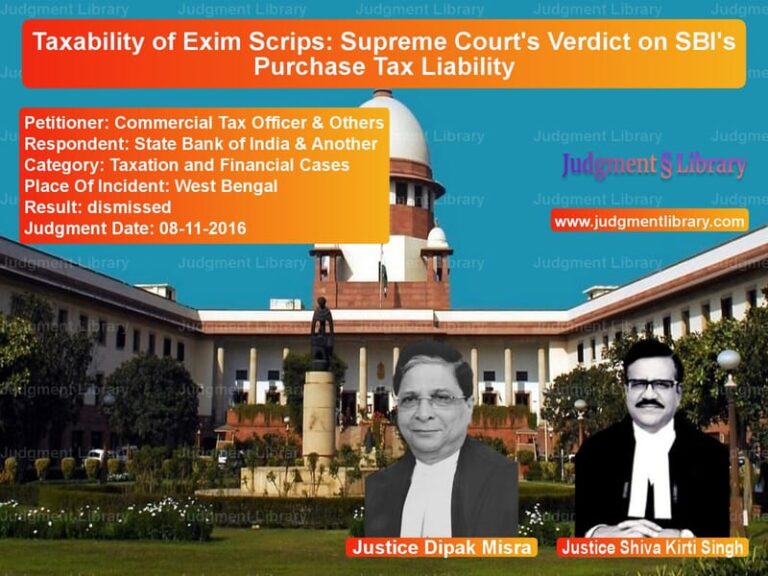Limitation Act Not Applicable to Recovery Tribunal Appeals: Supreme Court Rules
The case of International Asset Reconstruction Company of India Ltd. vs. The Official Liquidator of Aldrich Pharmaceuticals Ltd. & Others and Iridium India Telecom Ltd. vs. Doha Bank QSC & Another addressed the question of whether Section 5 of the Limitation Act, 1963, applies to appeals under Section 30(1) of the Recovery of Debts and Bankruptcy Act, 1993 (RDB Act). The Supreme Court ruled that the prescribed period of 30 days for filing appeals before the Debt Recovery Tribunal (DRT) cannot be extended under the Limitation Act.
Background of the Case
The case arose from appeals filed beyond the 30-day limitation period under Section 30(1) of the RDB Act, challenging orders passed by the Recovery Officer. The key contention was whether the Limitation Act could be invoked to condone the delay.
The appellants contended that the RDB Act was not a complete code by itself and that Section 5 of the Limitation Act should apply to allow condonation of delay. The respondents, however, argued that the specific language of the RDB Act excluded the applicability of the Limitation Act.
Key Legal Issues
- Whether Section 5 of the Limitation Act applies to appeals under Section 30(1) of the RDB Act.
- Whether the RDB Act is a complete code that excludes the application of the Limitation Act.
- Whether an appeal filed beyond the prescribed 30-day period can be entertained by the Tribunal.
Arguments by the Petitioner (Appellants)
- The appellants argued that the RDB Act does not expressly exclude the application of the Limitation Act.
- They contended that the Tribunal should have discretion to condone delays beyond 30 days in the interest of justice.
- They cited Section 29(2) of the Limitation Act, which allows special laws to have their own limitation periods while retaining the power to condone delays.
- They pointed to the broader objective of the RDB Act, which includes principles of natural justice.
Arguments by the Respondent (Official Liquidator, Doha Bank QSC & Others)
- The respondents contended that the RDB Act was enacted to expedite the recovery process and has its own framework for appeals.
- They argued that the Legislature specifically excluded the application of the Limitation Act to Section 30(1) appeals.
- They pointed out that Section 20(3) of the RDB Act explicitly provides for condonation of delay for appeals before the Appellate Tribunal, but no such provision exists for appeals under Section 30(1).
- They relied on judicial precedents that held that where a law provides a specific limitation period without a provision for extension, courts cannot invoke the Limitation Act.
Supreme Court’s Observations
- The Court noted that the RDB Act is a special law enacted to ensure quick disposal of recovery proceedings.
- It held that Section 30(1) does not provide any discretionary power to condone delay beyond 30 days.
- The Court emphasized that while the appellate tribunal under Section 20(3) has explicit power to condone delay, no such provision exists for the Debt Recovery Tribunal (DRT) under Section 30(1).
- The Court found that if the Legislature intended to allow condonation of delay under Section 30(1), it would have included an express provision like in Section 20(3).
Supreme Court’s Judgment
- The Supreme Court held that appeals under Section 30(1) of the RDB Act must be filed within 30 days, and this period cannot be extended.
- It ruled that the Limitation Act does not apply to these appeals.
- The Court dismissed the appeals, reinforcing that statutory timelines must be adhered to strictly in financial recovery proceedings.
- It held that the special framework of the RDB Act overrides general provisions of the Limitation Act.
Legal Principles Affirmed by the Judgment
- The RDB Act is a complete code and does not permit the application of the Limitation Act to appeals under Section 30(1).
- Where a statute prescribes a specific limitation period and does not provide for condonation of delay, courts cannot extend the deadline.
- The presence of a condonation provision in one section (Section 20(3)) and its absence in another (Section 30(1)) indicates a legislative intent to exclude condonation in the latter.
- Strict adherence to statutory timelines is essential for ensuring speedy recovery in financial matters.
Impact of the Judgment
- The ruling clarifies that financial recovery laws must be interpreted strictly to avoid unnecessary delays.
- It ensures that appeals against Recovery Officer orders are filed within the prescribed period, maintaining efficiency in debt recovery proceedings.
- The judgment discourages attempts to bypass statutory timelines through judicial discretion.
- It reinforces the principle that courts should respect legislative intent when dealing with special laws.
Conclusion
The Supreme Court’s ruling establishes a clear precedent that appeals under Section 30(1) of the RDB Act are subject to a strict 30-day limitation period without the possibility of condonation. This decision underscores the importance of adhering to procedural timelines in financial recovery cases and ensures that the objectives of the RDB Act are upheld.
Don’t miss out on the full details! Download the complete judgment in PDF format below and gain valuable insights instantly!
Download Judgment: International Asset vs The Official Liquida Supreme Court of India Judgment Dated 24-10-2017.pdf
Direct Downlaod Judgment: Direct downlaod this Judgment
See all petitions in Bankruptcy and Insolvency
See all petitions in Corporate Compliance
See all petitions in unfair trade practices
See all petitions in Judgment by Ranjan Gogoi
See all petitions in Judgment by Abhay Manohar Sapre
See all petitions in Judgment by Navin Sinha
See all petitions in dismissed
See all petitions in supreme court of India judgments October 2017
See all petitions in 2017 judgments
See all posts in Corporate and Commercial Cases Category
See all allowed petitions in Corporate and Commercial Cases Category
See all Dismissed petitions in Corporate and Commercial Cases Category
See all partially allowed petitions in Corporate and Commercial Cases Category







